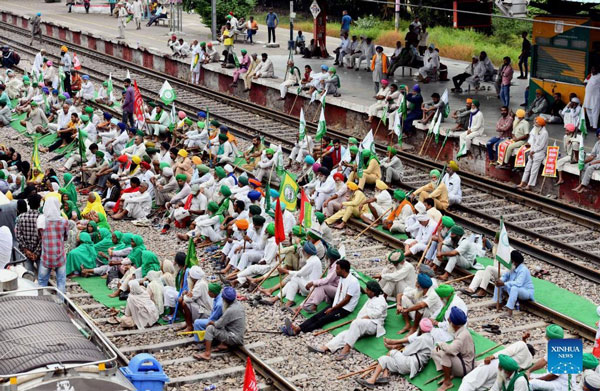
NEW DELHI | Xinhua | Authorities in the northern Indian state of Punjab Thursday diverted some trains and suspended internet services in some parts in the wake of ongoing farmers’ protest march.
The decision to divert trains on the Delhi-Amritsar route was made after farmers squatted on tracks at many places in Punjab to protest police action on farmers at the Shambhu border near Ambala district in Haryana, about 200 km from Delhi.
Scores of farmers with large convoys of tractors have been stopped at the Shambhu border since Tuesday and are not allowed to proceed toward Delhi to press for their demands including a minimum support price (MSP) for crops.
Farmers also staged protests at several toll plazas and disrupted officials from charging the commuters toll fee.
The call to stop trains in Punjab was given by the farmers’ organization Bhartiya Kisan Union (Indian Farmers Union). Likewise, another farmers’ union Samyukta Kisan Morcha (United Farmers Front) had asked for demonstrations at toll plazas to protest against the use of tear gas shells on farmers by police in Haryana.
Federal home ministry has also ordered suspension of telecom services in Shutrana, Khanauri and Fatehgarh Sahib in Punjab on Feb. 16.
Meanwhile, the situation at the Shambhu and Khanauri borders on Thursday remained peaceful compared to the past two days when police fired tear smoke shells on farmers. The border points have been heavily barricaded and adequate security has been deployed to stop the protesters from moving towards Delhi.
Meanwhile, another round of talks between three federal government ministers and agitating farmers is scheduled to take place in the northern city of Chandigarh. The previous two rounds of talks on Feb. 8 and Feb. 12 remained inconclusive.
The call for Delhi march was given by farmer unions to increase pressure on the federal government to fulfil their demands, which include implementation of the Swaminathan Commission’s recommendations, pensions for farmers and farm laborers, farm debt waiver, withdrawal of police cases, compensation for families of farmers who died during the previous agitation.
Approximately 200 farmer organizations are part of the protest plan.
India’s opposition leaders have extended support to the protesting farmers and condemned the government’s action to use police force to stop the farmers.
In September 2020, Indian government passed three contentious laws aimed at “modernizing” the country’s agriculture sector. However, farmers feared the new laws would weaken their position and make them dependent on corporates. In seeking revocation of the laws, thousands of farmers sat on strike on the borders of the national capital then.
The strike has been going on for over a year after. Afterwards, Indian Prime Minister Narendra Modi announced in a surprise address to the nation that his government was repealing the laws. ■
 The Independent Uganda: You get the Truth we Pay the Price
The Independent Uganda: You get the Truth we Pay the Price





